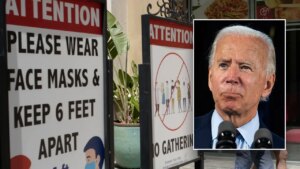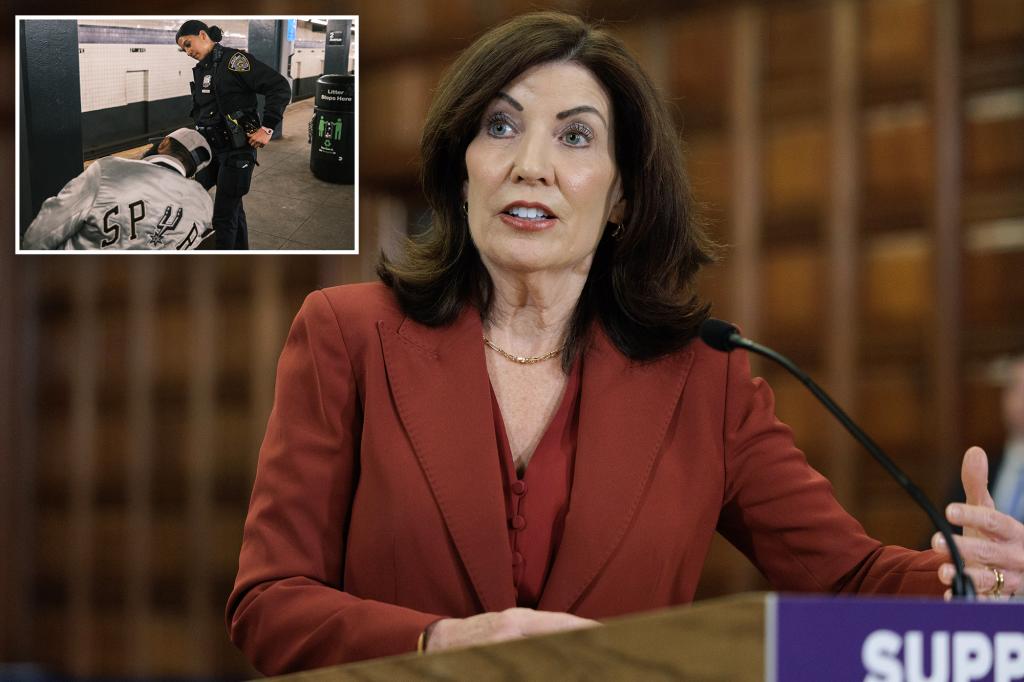It’s no April Fools.
Progressive groups including The Legal Aid Society are putting the squeeze on New York lawmakers to reject Gov. Kathy Hochul’s proposals on involuntary commitment and discovery reform – and helping hold the state budget past its April 1 deadline.
The budget impasse comes after lefty groups such as the largely taxpayer-funded nonprofit, mounted a pressure campaign involving well-paid backroom lobbying in Albany and even a high-profile think piece from author John Grisham.
Representatives for the Legal Aid Society blamed Hochul for the expected delay and applauded lawmakers in the state Assembly and Senate for “holding the line.”
“Rolling back discovery reforms should not, and must not, be the reason New York State’s budget does not get passed promptly,” a statement from Legal Aid states.
“Governor Hochul’s insistence on exploiting the budget process to push through policies, including repealing New York’s modernized and widely successful discovery statute, is misguided and delays the critical fiscal policies New Yorkers need — especially now, as Albany faces the loss of federal support.”
State Sen. George Borrello (R-Chautauqua) argued that Legal Aid has a conflict of interest in its opposition to the discovery laws, which were passed in 2019 and require prosecutors to turn over evidence to defendants within 20 or 35 days after arraignment.
“We have district attorneys’ offices that are starved, underfunded, understaffed. But we’re going to make the Legal Aid Society’s job easier with the discovery law,” he lamented.
The Legal Aid Society bills itself as the largest, most influential social justice law firm in New York City — and it helps 2 million city residents every year through its defense services, litigation and advocacy, according to its annual report.
The organization has received $290 million from the state to represent indigent New Yorkers since 2012, records show.
Legal Aid lists a few dozen of its attorneys as lobbyists for the organization, as well as paying CMW Strategies another $5,000 a month, according to a lobbying filing from this year.
Contracts also show Legal Aid helps represent domestic violence victims — a group that prosecutors argued have suffered under the discovery laws, as convictions statewide on that crime fell from 31% to 6% since their passage, officials said.
New York City’s five district attorneys support Hochul’s plan to tweak the laws to reduce the scope of evidence that prosecutors have to hand over to defense, limiting it to only what’s “relevant” to the charges.
A grab bag of progressive and criminal justice groups — including Legal Aid, the NAACP and the Innocence Project — that have coalesced into the Alliance To Protect Kalief’s Law argue that “relevant” language gives prosecutors too much power.
“Passage of Hochul’s proposal would be an affront to due process as it will risk that more evidence will be withheld, resulting in the likelihood that more innocent people will be unjustly convicted because a prosecutor — focused on proving their case — decided it was not necessary to disclose such information,” Grisham, who is a board member at the Innocence Project, wrote in a New York Daily News op-ed.
Twyla Carter, Legal Aid’s CEO, wrote in a post on X last month: “We cannot allow @GovKathyHochul to roll back vital discovery laws that prevent NYers from languishing in jail without evidence. We should demand more from our legal system, not less.”
Assemblyman Harvey Epstein (D-Manhattan) said opponents to Hochul’s discovery plan, like himself, are waiting on her to make a counterproposal on the topic before they budget.
“We’re only late because we don’t have the language,” he said. “I don’t think we’re going to disagree a lot on the money, so if she wants to move something, she’s got to tell us what she wants to say, so it’s really up to her.”
The progressive groups have also pressured lawmakers to oppose Hochul’s plan to expand involuntary commitment laws.
Hochul has argued Albany needs to deal with violent mentally ill people, especially in the subway.
Many lawmakers have argued that the state should make it easier to send people suffering from psychiatric issues who are a danger to themselves or others — like Michael Medlock, who battled mental illness for years before he shoved a straphanger onto the tracks in 2020 — into treatment against their will.
But two high-profile groups — the Mental Health Association in New York State and The Alliance For Rights and Recovery — have opposed Hochul’s proposals as unnecessary, given existing laws.
The Alliance has tapped Brown and Weinraub, one of the more powerful lobbying firms in Albany, to help fight Hochul’s involuntary commitment proposal, records show.
They will pay the firm $4,000 a month through the end of the year, per lobbying filings – on top of the $2,000 a month they pay for another lobbyist, Kevin Cleary, and roughly $5,000 they spend on in-house lobbying monthly.
The group also issued an “action” alert Monday to everyday New Yorkers, urging them to email and call Hochul and lawmakers in opposition to involuntary commitment.
“These proposals will traumatize more New Yorkers, especially those struggling with homelessness and mental illness, by extending policies that deploy police to make what are termed ‘mental hygiene arrests’ and initiate involuntary treatment,” the alert states. “Involuntary hospitalizations are not the most appropriate way to provide the food, shelter, or long-term support people need and deserve.”
Glenn Liebman, CEO for the Mental Health Association in New York State, said his group is instead pushing for more funding to help expand and provide better benefits for existing mental healthcare resources.
He’s also pitching incident review panels as a way to help identify and patch holes in the continuum of care for mentally ill people.
“What will impact these services is a 7.8% budget enhancement for mental health and an accountable critical incident review process,” Liebman said.
Hochul’s budget director Blake Washington said Monday the governor is willing to hold up the budget “as long as it takes” to get her proposals on discovery and involuntary commitment passed in the face of stiff opposition.
“Her principles out of this budget are steadfast and there are things that she just can’t compromise on,” Washington said.
“We’ll take as long as it takes to deliver.”
Existing state laws — as well as rights to due process and fairness — must be followed, said Justin Harrison, senior policy counsel at the New York Civil Liberties Union.
“The governor’s proposals are driven by fearmongering and would send us back to an era of widespread wrongful convictions and forced hospitalizations,” he said.
“Locking more vulnerable New Yorkers away because they are experiencing mental health crisis or simply because the government is hiding the ball in court doesn’t advance public safety. We are gratified that our lawmakers have rejected the changes so far, and we will continue to raise awareness on their harms and urge our state officials to invest in solutions that work.”
Read the full article here







